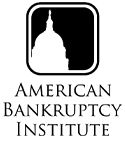consumer-bankruptcy
Hannah Hutman and Jeff Fraser, co-chairs of the ABI Consumer Bankruptcy Committee, thank all committee members for their participation this year.
The primary purposes of the bankruptcy process are to maximize the payments to a debtor’s creditors and provide debtors with a fresh start.[1] At first glance, the importance of firearm ownership appears unrelated to satisfy the purposes of the bankruptcy process.
In In re Smith, [1] the Third Circuit reminded consumer bankruptcy practitioners of the wrath of res judicata. The debtor owned an encumbered rental property with an assignment of rents to her mortgage lender.
Heather Giannino and Hannah Hutman, co-chairs of ABI’s Consumer Bankruptcy Committee, thank all committee members for their participation this year.
Over the past year, case law around privacy and data security has been evolving in crypto industry bankruptcies, as courts grapple with familiar issues in a new industry.
With the U.S. Trustee Program announcing that § 341 meetings for all chapter 7 and 13 cases will be heading to Zoom, there is no turning back now. Most routine consumer bankruptcy cases can now be completed without the debtor ever leaving home.
One of the most highly anticipated events of the year, ABI’s online Consumer Practice Extravaganza (CPEX) will return October 30-November 10, with on-demand access for an additional 60 days. Now in its third year, CPEX offers a wealth of CLE for the incredibly low price of just $100.
Congress’s decision to use the passive voice has cost at least one debtor the discharge of a significant debt. The U.S. Supreme Court in Bartenwerfer v.
Consumer and business bankruptcy attorneys alike have been conditioned to feel fear or awe, depending on the circumstances, at hearing the name Clifford White for almost 20 years. When White announced in 2022 that he would retire, consumer practitioners had been looking forward to the announcement of the new director, mostly to identify the focus that the U.S.
Pagination
This panel discusses the role of the subchapter V trustee, the parallels with mediation, and the meaning of "facilitating the development of a consensual plan."
This panel will discuss the impact on consumers, and consumer bankruptcy cases, when a consumer lender or loan-servicer files for chapter 11.
With the climate of COVID-19 in the rearview mirror, the consumer bankruptcy process now largely resembles the normalcy that had been elusive during the pandemic. However, remnants of COVID legislation have influenced escrow accounts of consumer debtors and consequently impacted mortgage creditor proofs of claim.
This panel will discuss the ins and outs of mediating consumer bankruptcy issues, including the types of issues typically mediated, selecting a mediator, and special considerations involved.
This panel will explore industry trends and commonalities between the parallel issues of failing health care systems and debtors bankrupted by medical debt. The panelists will discuss and debate what could happen when these two debtor groups overwhelm the bankruptcy system, the challenges that health care debtors, consumer debtors and insurance payors face today, and how practitioners across various insolvency disciplines involved in these industries can plan for the future with these trends on the horizon.
Join our panelists as they discuss the DOJ’s new student loan guidelines and provide context on how the guidelines will impact debtor attorneys, trustees and other entities in the bankruptcy process.
These overviews from ABI committee experts will arm you with vital information you can use in your practice well into the new year.
This panel will explore and discuss ethical issues that arise in consumer practice. The panelists will review recent cases and provide hypotheticals to invoke audience participation and discussion regarding topicsrelated to attorney fees, conflicts, and attorney/client privilege and confidentiality.
The steep rise in student loan debt is one of the most pressing issues our country faces as it strives to create a more just and equitable society. Getting a college degree has become steadily more expensive, and graduates are often left with overwhelming debt burdens that sometimes take decades to repay. Coupled with the nondischargeability of student debt under the Bankruptcy Code, the “student debt problem” has become one of the most pressing issues of our time.
This webinar will discuss how new Bankruptcy Student Loan Management Programs are helping debtors solve their student loan issues. The webinar will cover the issues affecting debtors and their student loans as well as the solutions and tools the courts are implementing.
Pagination

Patrick Hruby
Co-Chair
Tampa, FLBrock & Scott, PLLC
(813) 342-2200

Jeffrey S. Fraser
Co-Chair
Lake Worth, FLAlbertelli Law
(954) 647-0691

Daryl J. Smith
Communications Manager
Bradenton, FLChapter 13 Trustee Office
(941) 807-3590

Rachel A. Greenleaf
Education Director
Richmond, VAU.S. Bankruptcy Court, Eastern District of Virginia
(443) 786-1792

Keith Lee Rucinski Esq.
Membership Relations Director
Akron, OHOffice of the Chapter 13 Trustee
(330) 762-6335

Patrick Hruby
Newsletter Editor
Tampa, FLBrock & Scott, PLLC
(813) 342-2200

Ari David Kunofsky
Special Projects Leader
Washington, DCU.S. Department of Justice, Civil Division
(202) 353-5264
Robin Davis
Committee Administrator
Alexandria, VAAmerican Bankruptcy Institute
(703) 739-0800











